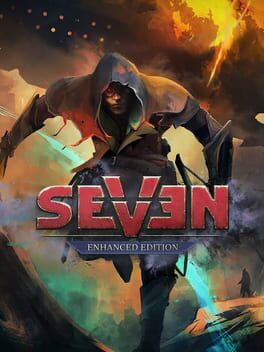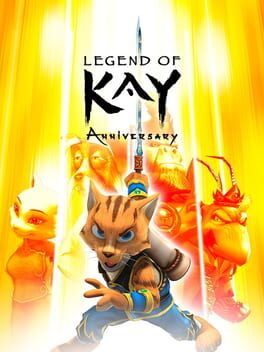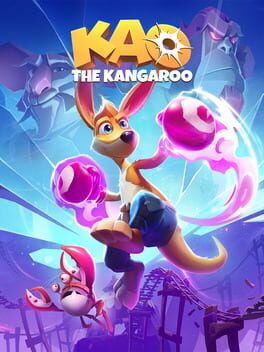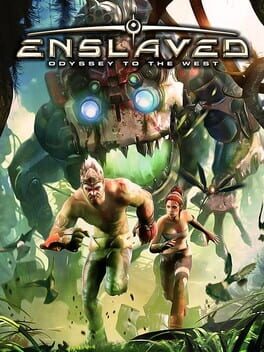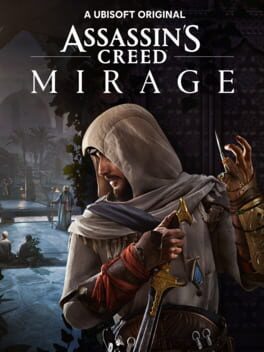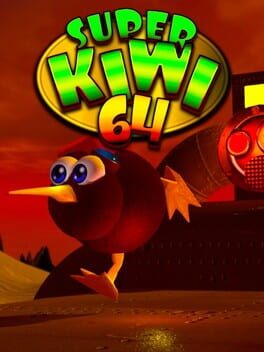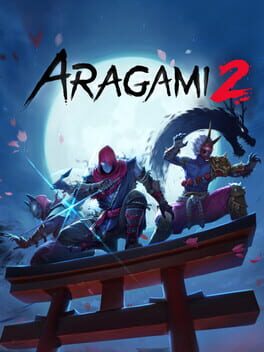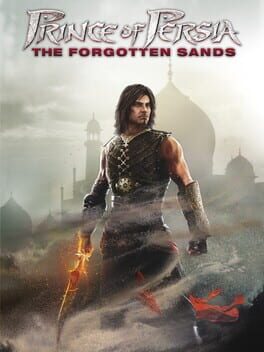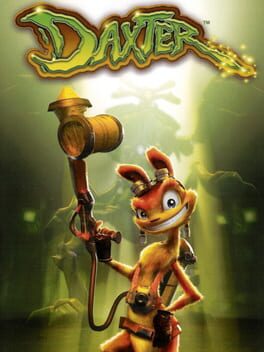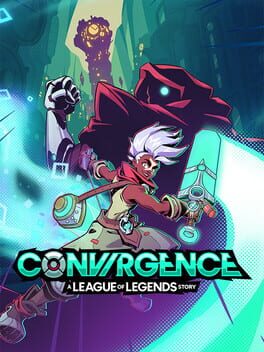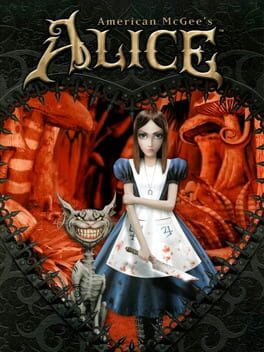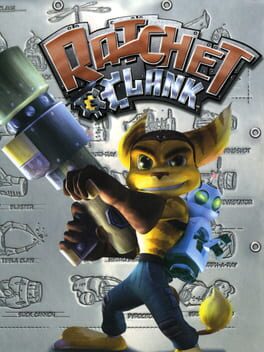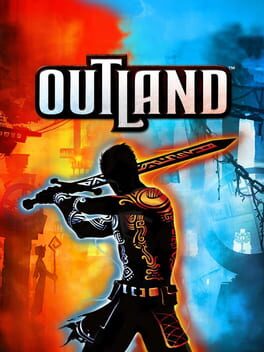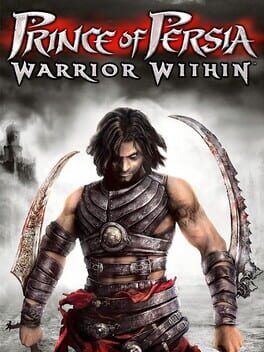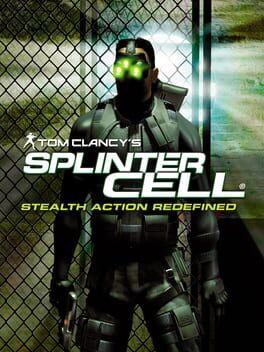blackcat
I really wanted to love this game. The open world is beautifully crafted and I loved the focus on stealth gameplay, but eventually I had to give up due to the janky controls, unintuitive UI, and above all else, the bugs. Quests would routinely break, forcing me to reload saves. If the quest bugs didn't make the game just about unplayable I might have pushed through the other issues.
Cute okayish platformer but the flaws stuck out enough that I couldn't finish it. The dialogue is atrocious and the combat sections drag on too long. What made me drop the game however was the really bad camera in some platforming sections, and a particular area where hitting an almost unavoidable cloud of poison gas would invert all the controls, which would always cause me to hit the cloud again and again until I died. That might work in some games but it's a terrible choice for a 3D platformer and after a number of attempts to get past that section I gave up and deleted the game. Waste of time.
2022
It's certainly one of the AC games of all time.
It's good to finally see an AC game that isn't embarrassed about the series it's a part of. Good stealth missions are finally back, and Baghdad is one of the best cities in the series.
Unfortunately, being built from the bones of AC Valhalla means that Mirage inherits many of its problems. I can tell that the dev team tried their best to make movement work well in Baghdad, speeding up Basim and adding objects that improve the flow of movement, but AC Valhalla's parkour system just doesn't work in a dense city environment and needs to be thrown out. The combat tries to be somewhere between the newer AC combat system and the old counter-based system, but it ends up being the worst of both worlds. It looks bad, it feels bad, but also it's easy to trivialize. Though I'd rather have it easy than have to suffer through it for longer.
Stealth is the best part of the game, with the open-ended stealth missions that were the highlight of AC Unity and Syndicate finally returning, but it also hasn't really evolved from a decade ago. The stealth system is very consistent and functional which is sadly rare for this series, but I can't help but feel most of its consistency comes from the AI awareness being cranked down through the floor. Enemies can't spot you from stupid distances like in AC Valhalla, but in Mirage they can barely see five metres in front of them. The entire AC series has suffered from having either hyper-aware or ridiculously unaware enemies, and Mirage is very much in the latter group. On top of that, the sizeable arsenal of tools you receive throughout the story and the teleport kill feature end up trivializing stealth even more. Mirage is definitely a step in the right direction when it comes to missions designed around stealth, but it began to feel hollow when I realized that the enemies posed little threat. Hopefully this is something Ubisoft can work on, but I doubt it will get better in future games.
The story is whatever, with all of its interesting moments happening at the end, but the game's ending has very little payoff if you didn't finish AC Valhalla, and I didn't.
Ultimately I still had a good time with AC Mirage and I hope Ubisoft will continue releasing smaller games like this in between the giant RPGs.
It's good to finally see an AC game that isn't embarrassed about the series it's a part of. Good stealth missions are finally back, and Baghdad is one of the best cities in the series.
Unfortunately, being built from the bones of AC Valhalla means that Mirage inherits many of its problems. I can tell that the dev team tried their best to make movement work well in Baghdad, speeding up Basim and adding objects that improve the flow of movement, but AC Valhalla's parkour system just doesn't work in a dense city environment and needs to be thrown out. The combat tries to be somewhere between the newer AC combat system and the old counter-based system, but it ends up being the worst of both worlds. It looks bad, it feels bad, but also it's easy to trivialize. Though I'd rather have it easy than have to suffer through it for longer.
Stealth is the best part of the game, with the open-ended stealth missions that were the highlight of AC Unity and Syndicate finally returning, but it also hasn't really evolved from a decade ago. The stealth system is very consistent and functional which is sadly rare for this series, but I can't help but feel most of its consistency comes from the AI awareness being cranked down through the floor. Enemies can't spot you from stupid distances like in AC Valhalla, but in Mirage they can barely see five metres in front of them. The entire AC series has suffered from having either hyper-aware or ridiculously unaware enemies, and Mirage is very much in the latter group. On top of that, the sizeable arsenal of tools you receive throughout the story and the teleport kill feature end up trivializing stealth even more. Mirage is definitely a step in the right direction when it comes to missions designed around stealth, but it began to feel hollow when I realized that the enemies posed little threat. Hopefully this is something Ubisoft can work on, but I doubt it will get better in future games.
The story is whatever, with all of its interesting moments happening at the end, but the game's ending has very little payoff if you didn't finish AC Valhalla, and I didn't.
Ultimately I still had a good time with AC Mirage and I hope Ubisoft will continue releasing smaller games like this in between the giant RPGs.
2022
2021
It's so different from the first game that it hardly feels like a sequel.
Aragami 2 is a grab bag of mechanics from various modern stealth games, with varying degrees of success. The fast movement and stealth kills are very smooth and satisfying, which is one of the only things carrying an otherwise unremarkable game, the other being co-op with your friends. The customization for your aragami is neat too.
You can take a large number of gadgets with you on missions, which can make stealth trivially easy unless you decide to limit yourself. The new combat system sucks and feels really tacked on. The game's greatest flaw though is that it reuses only a handful of levels over and over, simply changing which parts of each map you have access to in each mission. This means the game gets repetitive fast. I have a feeling that the developers may have bitten off more than they could chew and tried to go for quantity instead of a shorter game with more distinct levels.
If you're desperate for a stealth game, or you need a stealth game you can play with friends, it's not bad if you can get it cheap.
Aragami 2 is a grab bag of mechanics from various modern stealth games, with varying degrees of success. The fast movement and stealth kills are very smooth and satisfying, which is one of the only things carrying an otherwise unremarkable game, the other being co-op with your friends. The customization for your aragami is neat too.
You can take a large number of gadgets with you on missions, which can make stealth trivially easy unless you decide to limit yourself. The new combat system sucks and feels really tacked on. The game's greatest flaw though is that it reuses only a handful of levels over and over, simply changing which parts of each map you have access to in each mission. This means the game gets repetitive fast. I have a feeling that the developers may have bitten off more than they could chew and tried to go for quantity instead of a shorter game with more distinct levels.
If you're desperate for a stealth game, or you need a stealth game you can play with friends, it's not bad if you can get it cheap.
Mediocre game saved by excellent platforming.
The Forgotten Sands is, well, forgettable. The story is boring and the acrobatic combat of the Sands of Time trilogy has been replaced with repetitive hack-and-slash combat. It’s not difficult, but it goes on for so long that it’s mind numbing. For some reason Ubisoft has never figured out that the unique selling point of Prince of Persia was always its stylish platforming and it’s enough to carry the games without overly drawn out fight sequences. The acrobatic combat of previous games was at least interesting and unique, but the Forgotten Sands system is so tedious that I would have quit the game if not for the platforming.
The platforming feels tighter than it did in previous games with smoother transitions between moves and some new moves. The most notable addition is the water freezing power which adds an extra layer to climbing puzzles. Some of the climbing sequences towards the end of the game involving water freezing were very challenging and by far the best parts of the game.
The Forgotten Sands is, well, forgettable. The story is boring and the acrobatic combat of the Sands of Time trilogy has been replaced with repetitive hack-and-slash combat. It’s not difficult, but it goes on for so long that it’s mind numbing. For some reason Ubisoft has never figured out that the unique selling point of Prince of Persia was always its stylish platforming and it’s enough to carry the games without overly drawn out fight sequences. The acrobatic combat of previous games was at least interesting and unique, but the Forgotten Sands system is so tedious that I would have quit the game if not for the platforming.
The platforming feels tighter than it did in previous games with smoother transitions between moves and some new moves. The most notable addition is the water freezing power which adds an extra layer to climbing puzzles. Some of the climbing sequences towards the end of the game involving water freezing were very challenging and by far the best parts of the game.
2006
Excellent platformer with a great art style and engaging mechanics. Ekko was the perfect choice for a platformer with his acrobatic abilities and time manipulation powers. I also really appreciate the customizable difficulty options. Some players might find it too short but I think it doesn't need to be longer.
I'm not very invested in League of Legends lore, but I like Ekko and Zaun is the region I find most interesting. The story is nothing to write home about, but there were some enjoyable moments. Zaun is a joy to traverse with Ekko's excellent controls and arsenal of abilities. Collectibles reward exploration and platforming skill and I had a blast 100%ing the game.
My only gripe is the combat. It's fast and feels great, but there's simply too much of it. Even with the combat difficulty turned all the way down, each fight dragged on for several minutes. This game needed fewer mob encounters, or to make them much shorter. The combat is definitely at its best in the one-on-one boss fights, which I found to be among the best parts of the game. It just gets tedious when facing regular enemies, which you will do a lot.
Despite these minor issues, Convergence is a great platformer that I enjoyed enough to 100%, which I very rarely do in games.
I'm not very invested in League of Legends lore, but I like Ekko and Zaun is the region I find most interesting. The story is nothing to write home about, but there were some enjoyable moments. Zaun is a joy to traverse with Ekko's excellent controls and arsenal of abilities. Collectibles reward exploration and platforming skill and I had a blast 100%ing the game.
My only gripe is the combat. It's fast and feels great, but there's simply too much of it. Even with the combat difficulty turned all the way down, each fight dragged on for several minutes. This game needed fewer mob encounters, or to make them much shorter. The combat is definitely at its best in the one-on-one boss fights, which I found to be among the best parts of the game. It just gets tedious when facing regular enemies, which you will do a lot.
Despite these minor issues, Convergence is a great platformer that I enjoyed enough to 100%, which I very rarely do in games.
This game is a strange relic.
Its atmosphere is potent and as a sucker for anything based on Alice in Wonderland I was immediately pulled into this dark, twisted version of Wonderland. The art style and music are still great to this day.
The weakest part of this game is playing it.
It's billed as a platformer but it's closer to a third person shooter. The platforming is stiff and janky and feels nothing like the good platformers of the era. The game is mostly about fighting all sorts of bizarre creatures with a large arsenal of weapons. Their designs are very creative which is a plus, but they all feel like you're slapping enemies with a pool noodle, so the combat doesn't feel very good.
The cool theme is enough to make this worth playing if it interests you, but definitely play it on PC, and be prepared to save a lot. If this game didn't have quick saves I definitely wouldn't have finished it.
Its atmosphere is potent and as a sucker for anything based on Alice in Wonderland I was immediately pulled into this dark, twisted version of Wonderland. The art style and music are still great to this day.
The weakest part of this game is playing it.
It's billed as a platformer but it's closer to a third person shooter. The platforming is stiff and janky and feels nothing like the good platformers of the era. The game is mostly about fighting all sorts of bizarre creatures with a large arsenal of weapons. Their designs are very creative which is a plus, but they all feel like you're slapping enemies with a pool noodle, so the combat doesn't feel very good.
The cool theme is enough to make this worth playing if it interests you, but definitely play it on PC, and be prepared to save a lot. If this game didn't have quick saves I definitely wouldn't have finished it.
2002
A decent start to a beloved series, but sadly I can't agree that it's one of the best entries.
This game still looks great for a PS2 game and the music is fantastic. The levels are fun to explore and the characters you run into are funny and memorable. The large roster of wacky weapons sets this game apart from the many other platformers of the time.
The problem is that Ratchet controls like ass. He's slow to react to inputs, and he still keeps moving for a bit after stopping inputs, which caused me many extremely frustrating deaths. Controls absolutely make or break platformers, along with the camera, which also caused issues at times in this game.
I may have been able to forgive these issues if the game didn't have such punishing checkpoints. Later in the game, deaths lose a significant chunk of progress, and many of my deaths were caused by the janky controls, or poor enemy placement. In later levels, there are many enemies placed well out of range of most of Ratchet's weapons, and can only be defeated by sniping them with a tiny handful of specific weapons, which usually have very limited and/or costly ammo. And you have to dodge their projectiles with Ratchet's bad controls at the same time.
Generally, the parts of the game that focus on pure platforming without any gimmicks or enemies are quite good, and the issues are less frustrating earlier in the game when getting hit and dying aren't so costly. But the issues were so frustrating that I have never felt like replaying this game, while I have replayed others in the series multiple times. Almost all of these issues were immediately fixed in the sequel.
This game still looks great for a PS2 game and the music is fantastic. The levels are fun to explore and the characters you run into are funny and memorable. The large roster of wacky weapons sets this game apart from the many other platformers of the time.
The problem is that Ratchet controls like ass. He's slow to react to inputs, and he still keeps moving for a bit after stopping inputs, which caused me many extremely frustrating deaths. Controls absolutely make or break platformers, along with the camera, which also caused issues at times in this game.
I may have been able to forgive these issues if the game didn't have such punishing checkpoints. Later in the game, deaths lose a significant chunk of progress, and many of my deaths were caused by the janky controls, or poor enemy placement. In later levels, there are many enemies placed well out of range of most of Ratchet's weapons, and can only be defeated by sniping them with a tiny handful of specific weapons, which usually have very limited and/or costly ammo. And you have to dodge their projectiles with Ratchet's bad controls at the same time.
Generally, the parts of the game that focus on pure platforming without any gimmicks or enemies are quite good, and the issues are less frustrating earlier in the game when getting hit and dying aren't so costly. But the issues were so frustrating that I have never felt like replaying this game, while I have replayed others in the series multiple times. Almost all of these issues were immediately fixed in the sequel.
2011
Outland is nothing special but I enjoyed it. It's short enough to not overstay its welcome.
The metroidvania label isn't really accurate and I think it gives players the wrong expectations. Outland is a largely linear platformer that allows you to revisit previous areas and collect things you missed, which sometimes require abilities you get later.
The game is entirely carried by its beautiful art style and the colour changing mechanic, which looks simple but adds plenty of challenge to the platforming sections. This makes Outland a bit different from the dozens of platformers out there.
Combat is serviceable but unremarkable. Some sections of the game consist of not much besides enemies lined up one after another, which starts to feel repetitive as there's not much to the combat besides switching colours according to the colour of the enemy. The bosses, however, are the game's highlights. All of them are unique and incorporate platforming and bullet hell mechanics to make them very challenging, but incredibly satisfying to overcome.
The metroidvania label isn't really accurate and I think it gives players the wrong expectations. Outland is a largely linear platformer that allows you to revisit previous areas and collect things you missed, which sometimes require abilities you get later.
The game is entirely carried by its beautiful art style and the colour changing mechanic, which looks simple but adds plenty of challenge to the platforming sections. This makes Outland a bit different from the dozens of platformers out there.
Combat is serviceable but unremarkable. Some sections of the game consist of not much besides enemies lined up one after another, which starts to feel repetitive as there's not much to the combat besides switching colours according to the colour of the enemy. The bosses, however, are the game's highlights. All of them are unique and incorporate platforming and bullet hell mechanics to make them very challenging, but incredibly satisfying to overcome.
The edginess comes across as a little immature and it makes the game feel more dated than its predecessor, but I could live with it and this wasn't why I abandoned Warrior Within.
The platforming is still as great as it was in The Sands of Time and the improved combat is a welcome addition. But it seems the addition of the new combat system meant that Ubisoft wanted to cram as much of it into the game as possible.
My favorite parts of The Sands of Time were the platforming puzzles. The Sands of Time definitely also suffered from an overabundance of battles, but at least you typically got them out of the way before a long platforming section. Warrior Within frequently throws another wave of enemies at you each time you reach a new platform during a platforming section. The new combat system is fun to play around with, but constantly having platforming interrupted by enemies gets incredibly tedious, especially when taking damage can be very punishing. I would be able to overlook this if the game didn't have such sparse checkpoints. But as it is, I got really tired of fighting the same enemies over and over and never getting a break from combat.
Eventually I'd had enough when I finally overcame a difficult section after many attempts, only for a bug to force me to restart the area. That was the end of Warrior Within for me.
The platforming is still as great as it was in The Sands of Time and the improved combat is a welcome addition. But it seems the addition of the new combat system meant that Ubisoft wanted to cram as much of it into the game as possible.
My favorite parts of The Sands of Time were the platforming puzzles. The Sands of Time definitely also suffered from an overabundance of battles, but at least you typically got them out of the way before a long platforming section. Warrior Within frequently throws another wave of enemies at you each time you reach a new platform during a platforming section. The new combat system is fun to play around with, but constantly having platforming interrupted by enemies gets incredibly tedious, especially when taking damage can be very punishing. I would be able to overlook this if the game didn't have such sparse checkpoints. But as it is, I got really tired of fighting the same enemies over and over and never getting a break from combat.
Eventually I'd had enough when I finally overcame a difficult section after many attempts, only for a bug to force me to restart the area. That was the end of Warrior Within for me.
A solid stealth game for the time, but it's rough to play these days.
The atmosphere and lighting hold up better than everything else. This game still looks great for its age thanks to superb lighting.
The light and darkness mechanics are excellent to this day and I wish more stealth games copied them, but sometimes it can be a little finicky as you're often not hidden unless you're in total darkness. Enemy AI is extremely jumpy and often just moving a tiny fraction too fast, or not being in a perfect shadow, will result in an immediate alert. There is no moment of leeway between being seen by an enemy and the alarm being triggered, and enemies can go from unaware to whipping around and blasting your ass instantly.
The alarm system works really weirdly in this game, which is an absolute headache if you don't know about it before you start playing. You have to hide bodies perfectly or reaching checkpoints will trigger the alarm, even if realistically nobody would see the bodies. And three alarms will fail the mission.
The shooting in this game made me want to tear my hair out. It's horribly inaccurate on purpose. You can line up a perfect shot at a light and still miss and alert all the enemies nearby. I get that the game wants to discourage shooting your way through the levels, but it ends up completely blowing stealth and it's not the player's fault. Every time this happened I had zero shame reloading saves until trying to simply eliminate a light source didn't get me screwed by bullets exiting my gun sideways.
It seems that Ubisoft wasn't entirely confident in the stealth gameplay as the game includes some forced action and shootout sequences, which are definitely the worst part because the shooting mechanics are intentionally designed to make shooting difficult. The game shoots itself in the foot there.
This game was a promising start to the series, but its flaws are very noticeable, especially so many years later. Frankly without quick saves this game would suck because of the twitchy AI and unpredictable bullet trajectory. If you're really interested in the history of stealth games and you want to play through all of them, this game is worth a look. But if you're not a huge fan of the Splinter Cell series or playing through every stealth game out there, I suggest skipping to Chaos Theory.
The atmosphere and lighting hold up better than everything else. This game still looks great for its age thanks to superb lighting.
The light and darkness mechanics are excellent to this day and I wish more stealth games copied them, but sometimes it can be a little finicky as you're often not hidden unless you're in total darkness. Enemy AI is extremely jumpy and often just moving a tiny fraction too fast, or not being in a perfect shadow, will result in an immediate alert. There is no moment of leeway between being seen by an enemy and the alarm being triggered, and enemies can go from unaware to whipping around and blasting your ass instantly.
The alarm system works really weirdly in this game, which is an absolute headache if you don't know about it before you start playing. You have to hide bodies perfectly or reaching checkpoints will trigger the alarm, even if realistically nobody would see the bodies. And three alarms will fail the mission.
The shooting in this game made me want to tear my hair out. It's horribly inaccurate on purpose. You can line up a perfect shot at a light and still miss and alert all the enemies nearby. I get that the game wants to discourage shooting your way through the levels, but it ends up completely blowing stealth and it's not the player's fault. Every time this happened I had zero shame reloading saves until trying to simply eliminate a light source didn't get me screwed by bullets exiting my gun sideways.
It seems that Ubisoft wasn't entirely confident in the stealth gameplay as the game includes some forced action and shootout sequences, which are definitely the worst part because the shooting mechanics are intentionally designed to make shooting difficult. The game shoots itself in the foot there.
This game was a promising start to the series, but its flaws are very noticeable, especially so many years later. Frankly without quick saves this game would suck because of the twitchy AI and unpredictable bullet trajectory. If you're really interested in the history of stealth games and you want to play through all of them, this game is worth a look. But if you're not a huge fan of the Splinter Cell series or playing through every stealth game out there, I suggest skipping to Chaos Theory.
